|
|
|
Sort Order |
|
|
|
Items / Page
|
|
|
|
|
|
|
| Srl | Item |
| 1 |
ID:
124733
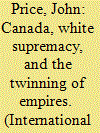

|
|
|
|
|
| Publication |
2013.
|
| Summary/Abstract |
Taking a transnational approach, this essay explores the dynamic circuits of global racisms, resistance, and imperial politics that obliged Canadian policymakers to secure racist exclusions while simultaneously obscuring them. The case studies examined in this essay-British Columbia's denial of the franchise to First Nations and Chinese, adoption of the Natal Act, and the comprehensive federal exclusions adopted after the 1907 white race riots in Vancouver-illustrate how racist immigration policies, both provincial and federal, had to take into account resistance and international factors as perceived by the British Colonial Office. Taken in conjunction with Indigenous history, the history of transpacific migration to Canada offers important insights into the role of white supremacy in a colonial settler state such as Canada.
|
|
|
|
|
|
|
|
|
|
|
|
|
|
|
|
| 2 |
ID:
124723
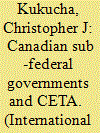

|
|
|
|
|
| Publication |
2013.
|
| Summary/Abstract |
Canadian provinces and territories have gained increasing relevance in matters of international trade over the last several decades. The possibility of a Canada-European Union Comprehensive Economic and Trade Agreement, however, marks the first time that sub-federal governments in Canada have been directly involved in specific areas of negotiations. The significance of this development, examined in this series of policy papers, can be organized under five overarching themes: 1) the negotiation, ratification, and implementation of foreign trade agreements; 2) the need to distinguish between process activity and actual policy outcomes; 3) the ongoing relevance of Canadian federalism; 4) the impact of non-governmental actors, especially civil society; and 5) the differing interpretations of academics, practitioners, business, and societal groups.
|
|
|
|
|
|
|
|
|
|
|
|
|
|
|
|
| 3 |
ID:
124726


|
|
|
|
|
| Publication |
2013.
|
| Summary/Abstract |
Why have the negotiations of a Comprehensive Economic and Trade Agreement (CETA) between Canada and the European Union taken so long? We argue that the delay is in good part the result of a weakly designed process for intergovernmental decision making: the role for provincial and territorial governments in international trade negotiations is still too limited and does not extend to final decisions about the text of any agreement. The limited role for provinces and the fact that there is no process that requires them to formally commit to an agreement leave open the real possibility that one or more provinces could choose not to fully implement any deal that is concluded. As a result, provinces possess negotiating leverage vis-à-vis Ottawa, thereby making it difficult for the federal government to agree to the trade-offs-which are of a geographical nature in CETA's case-that are necessary for reaching a positive agreement.
|
|
|
|
|
|
|
|
|
|
|
|
|
|
|
|
| 4 |
ID:
124728
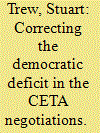

|
|
|
|
|
| Publication |
2013.
|
| Summary/Abstract |
The federal government claims that the Canada-EU Comprehensive Economic and Trade Agreement (CETA) negotiations have been the most transparent and participatory in Canadian history. Labour, environmental, social justice, and other civil society groups that are critical of the proposed agreement for various reasons would argue that their perspectives have been excluded from the official federal dialogue. This article looks at some of the efforts of non-governmental (civil society) actors, and in particular the Trade Justice Network and its member organizations, to affect the CETA negotiations in other ways, with an emphasis on contact with provincial governments, municipalities, European decision makers, and other non-governmental groups in Canada and Europe. It is argued that the exclusion of critical views shows an inherent democratic deficit in the CETA negotiations that privileges corporate insiders at the expense of civil society, the public, and even elected officials. Notwithstanding this deficit, the success of the civil society campaigns can be seen in the problem areas delaying a successful conclusion of negotiations, including new public procurement restrictions for Canadian municipalities and pharmaceutical patent term extensions. For the Trade Justice Network, these areas also help explain how the agreement narrows the fields of economic, environmental, and social governance in Canada.
|
|
|
|
|
|
|
|
|
|
|
|
|
|
|
|
| 5 |
ID:
124724


|
|
|
|
|
| Publication |
2013.
|
| Summary/Abstract |
Canada's federal government has exclusive authority to commit Canada to international treaties, but, under the Canadian constitution, compliance with treaty obligations that extend into areas of provincial competence is solely within provincial jurisdiction. As well, while Canada is responsible to its treaty partners if provinces act contrary to Canada's obligations, the provinces are not directly accountable. The absence of a direct legal requirement to fulfil treaty obligations means that incentives for provincial compliance are weakened and, in turn, that the reliability of Canadian obligations relating to matters within provincial jurisdiction is diminished.
This paper explores the prospects for using an intergovernmental agreement to address the gap between provincial action and federal responsibility. While such an agreement could express each province's commitment to comply with Canadian treaty obligations, intergovernmental agreements have some inherent weaknesses that make them an imperfect commitment device
|
|
|
|
|
|
|
|
|
|
|
|
|
|
|
|
| 6 |
ID:
124729


|
|
|
|
|
| Publication |
2013.
|
| Summary/Abstract |
The Canadian Co-operation Project (CCP) was one of the more unusual episodes in the economic and cultural relationship of Canada and the United States. Conceived between the federal government and the Hollywood film industry, the 1948 agreement called on Hollywood to produce more films in Canada and to make efforts to promote American tourism in Canada. The paper argues that the CCP was less the surrender to Hollywood than is generally understood and more an early example of cultural diplomacy in which the Canadian government used cultural relations with the United States for its own ends, primarily the promotion of tourism in Canada
|
|
|
|
|
|
|
|
|
|
|
|
|
|
|
|
| 7 |
ID:
124734


|
|
|
|
|
| Publication |
2013.
|
| Summary/Abstract |
This article revisits volume 1 of International Journal to illustrate the power of "critical remembrance" to deepen the discourse about and sharpen the debate over contemporary global issues and Canada's potential as a force for peace and progress. Setting the origins of the journal in historical context, the article considers the immediate postwar mood of its contributors and their myriad suggestions for Canada's appropriate role. The article concludes with a plea for "historical literacy" as an indispensable starting point for reimagining the world in which we live.
|
|
|
|
|
|
|
|
|
|
|
|
|
|
|
|
| 8 |
ID:
124731
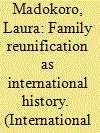

|
|
|
|
|
| Publication |
2013.
|
| Summary/Abstract |
Building on the emerging scholarship that treats the history of global migration as a crucial aspect of international history, this article examines the little known 1973 family reunification agreement between Canada and the People's Republic of China. The article contends that, despite its limitations, the agreement was an important milestone in the history of Sino-Canadian relations. Through a detailed micro-history, the article reveals the shifting political currents that led to the agreement's successful negotiation, highlighting how, by the early 1970s, Canada and other Western nations were embracing the notion of family reunification as an important human rights issue in the ongoing contests of the global Cold War.
|
|
|
|
|
|
|
|
|
|
|
|
|
|
|
|
| 9 |
ID:
124725
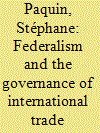

|
|
|
|
|
| Publication |
2013.
|
| Summary/Abstract |
When the European Union (EU) and the Canadian government announced the launching of negotiations to create a "new generation" free trade agreement, the EU insisted that provincial representatives be included on the Canadian negotiating team. The goal of this article is to explain why the provinces have gradually become key, indeed indispensable, actors in international trade negotiations. I examine how international trade negotiations are conducted in Canada, noting the enhanced role for provincial governments, and I focus on a comparison between the Canada-US free trade negotiations and the discussions for a Comprehensive Economic and Trade Agreement (CETA) with Europe.
|
|
|
|
|
|
|
|
|
|
|
|
|
|
|
|
| 10 |
ID:
124732


|
|
|
|
|
| Publication |
2013.
|
| Summary/Abstract |
This article discusses the historical evolution of norms of sovereignty, non-intervention, territorial integrity, and self-determination in international relations. It shows the degree to which their meanings and weight have varied and considers the bumpy historical relationship between international norms and practice. The twentieth century witnessed increasing tension between the hardening of sovereignty and non-intervention norms and the development of international human rights norms. The article then discusses normative inconsistencies and the variability of application of norms in practice in the post-Cold War era. It concludes by suggesting ways in which international society might mitigate these inconsistencies and the confusion that attends them
|
|
|
|
|
|
|
|
|
|
|
|
|
|
|
|
| 11 |
ID:
124727


|
|
|
|
|
| Publication |
2013.
|
| Summary/Abstract |
Canada and the European Union (EU) began negotiating a comprehensive economic and trade agreement (CETA) in May 2009. The authors survey both the process and the content of CETA from the perspective of the province of Quebec. For the first time, Canadian provinces and territories have fully participated in international trade negotiations that will impact them directly and engender important economic benefits. CETA will ensure that Canadian provinces and territories obtain real market access for their goods and services to the EU's 500 million consumers. It will encourage and increase foreign investment as well as create further labour mobility between Canada and the EU. Quebec will benefit from a growing and deeper relationship with the EU through trade and cooperation, thereby fostering economic globalization and integration.
|
|
|
|
|
|
|
|
|
|
|
|
|
|
|
|
|
|
|
|
|